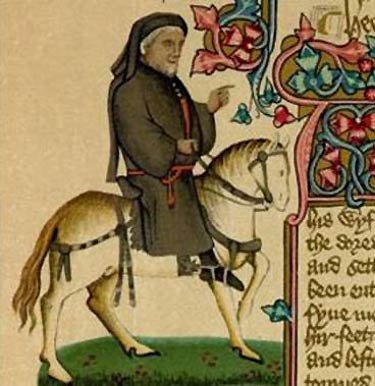“Whan That Aprill”
"The Canterbury Tales", Canterbury Tales, Chaucer, Geoffrey Chaucer, History
On this day (or possibly the next) in 1394, Geoffrey Chaucer’s twenty-nine pilgrims met at the Tabard Inn in Southwark to prepare for their departure to Canterbury. Chaucer’s poem condenses the four to five day trip into one, and scholars have used various textual references and astrological calculations to establish that day as the day before Easter, thus allowing the pilgrims to arrive at Canterbury Easter morning, after a fifty-five-mile hike through a pleasant English springtime.
Here begins the Book
of the Tales of Canterbury
1: Whan that aprill with his shoures soote
2: The droghte of march hath perced to the roote,
3: And bathed every veyne in swich licour
4: Of which vertu engendred is the flour;
5: Whan zephirus eek with his sweete breeth
6: Inspired hath in every holt and heeth
7: Tendre croppes, and the yonge sonne
8: Hath in the ram his halve cours yronne,
9: And smale foweles maken melodye,
10: That slepen al the nyght with open ye
11: (so priketh hem nature in hir corages);
12: Thanne longen folk to goon on pilgrimages,
13: And palmeres for to seken straunge strondes,
14: To ferne halwes, kowthe in sondry londes;
15: And specially from every shires ende
16: Of engelond to caunterbury they wende,
17: The hooly blisful martir for to seke,
18: That hem hath holpen whan that they were seeke.
19: Bifil that in that seson on a day,
20: In southwerk at the tabard as I lay
21: Redy to wenden on my pilgrymage
22: To caunterbury with ful devout corage,
23: At nyght was come into that hostelrye
24: Wel nyne and twenty in a compaignye,
25: Of sondry folk, by aventure yfalle
26: In felaweshipe, and pilgrimes were they alle,
27: That toward caunterbury wolden ryde.
28: The chambres and the stables weren wyde,
29: And wel we weren esed atte beste.
30: And shortly, whan the sonne was to reste,
31: So hadde I spoken with hem everichon
32: That I was of hir felaweshipe anon,
33: And made forward erly for to ryse,
34: To take oure wey ther as I yow devyse.
——————————-
My favorite quotation:
NPT 2805 Sir, sey somwhat of huntyng, I yow preye.




